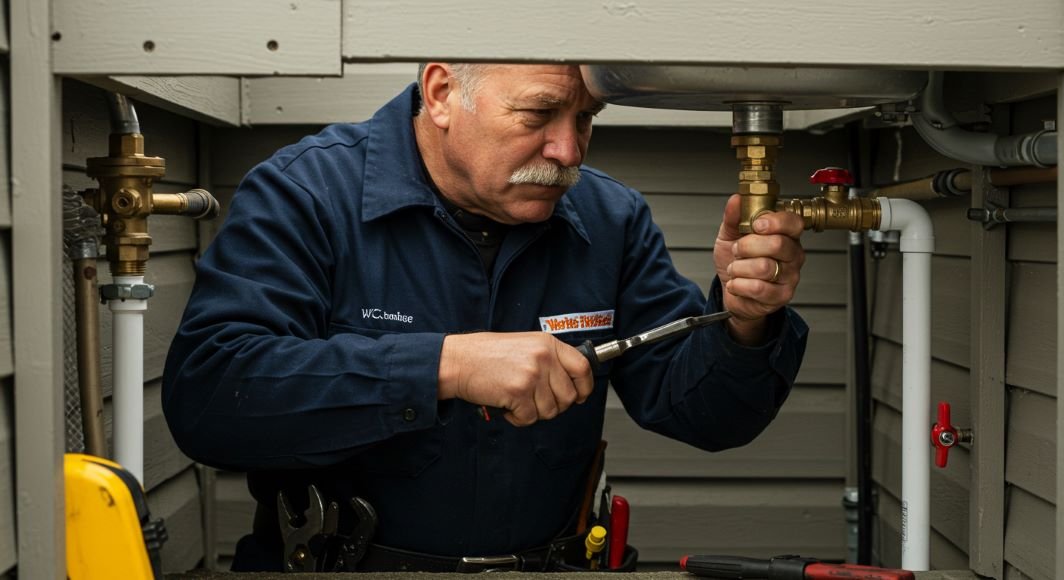The main difference between a plumber and a master plumber comes down to experience, licensing, and the ability to manage complex projects. Standard plumbers, often called journeymen, handle everyday plumbing tasks such as repairs, installations, and maintenance. Master plumbers, on the other hand, have advanced qualifications and are often licensed to supervise teams, draft contracts, and work on large-scale projects.
Each state has different regulations for plumbing professionals, with some requiring multiple levels of certification. In general, master plumbers must pass a licensing exam and gain extensive hands-on experience before earning their title. Understanding these distinctions can help when deciding who to hire for a plumbing job.
Learn more about the levels of plumbing, salaries, and qualifications.
Here's What We Have Covered In This Article
How to Become a Master Plumber
Becoming a master plumber requires more than just experience. It involves formal training, passing an exam, and obtaining a state-issued license. While the requirements vary, the general path includes:
- Apprenticeship Training – Typically lasting 4-5 years, apprentices learn the trade under licensed plumbers.
- Journeyman Status – After completing apprenticeship hours, plumbers must often pass an exam to become journeymen.
- Experience Requirement – To qualify for the master plumber exam, most states require several years of journeyman experience.
- Master Plumber Exam – The test covers plumbing systems, building codes, and business regulations.
Master plumbers need to understand both the technical and legal aspects of plumbing, including contract law and consumer protection. This ensures they can manage projects professionally and comply with state regulations.
State Licensing for Master Plumbers
Once a plumber passes the master plumber exam, they receive a state-issued license. In many states, this license must be renewed periodically, with continuing education required to stay up to date with plumbing codes and best practices.
Homeowners should always check a plumber’s license number and verify their credentials before hiring. Master plumbers are more likely to have the expertise needed for large-scale projects or complex plumbing issues, while journeyman plumbers can handle routine repairs and installations.
Plumber vs Master Plumber: Which One Do You Need?
Choosing between a plumber and a master plumber depends on the complexity of the job. While both professionals are skilled in plumbing systems, their qualifications and responsibilities differ.
When to Hire a Standard Plumber
A standard plumber, also known as a journeyman, is suitable for most routine plumbing tasks. These include:
- Fixing leaks, clogged drains, and running toilets
- Installing sinks, taps, showers, and toilets
- Repairing or replacing water heaters
- Maintaining and upgrading household plumbing systems
- Carrying out general plumbing work in homes and businesses
Journeyman plumbers are trained to handle common plumbing issues and often work under the supervision of a master plumber. If the job is straightforward and doesn’t require complex planning, hiring a standard plumber is usually enough.
When a Master Plumber is Necessary
Master plumbers are more experienced and qualified to take on large-scale or highly regulated projects. You may need a master plumber if:
- You’re building a new home and need a full plumbing system installed
- Your project requires permits and compliance with local plumbing codes
- You’re carrying out major renovations that involve moving or replacing plumbing systems
- You need a plumbing contractor to oversee a team of plumbers
- Your plumbing issue is complex, such as a commercial-grade water system or industrial piping
Master plumbers are also authorised to sign off on projects and ensure they meet safety and legal standards. If a job involves detailed planning, coordination with other trades, or compliance with strict regulations, a master plumber is the right choice.
Did You Know?
-
As of 2023, there are approximately 436,000 plumbers, pipefitters, and steamfitters employed in the United States.
-
The average annual salary for plumbers in the U.S. is $61,550, with the top 25% earning up to $80,190 per year.
How to Check Credentials Before Hiring
Before hiring any plumber, it’s important to verify their qualifications to ensure they’re properly licensed and experienced for the job. Here’s what to check:
- License Number – Ask for their plumbing license and verify it with the relevant state authority. Master plumbers should have a higher-level license than standard plumbers.
- Experience Level – Check how many years they’ve been in the trade and what types of projects they’ve worked on.
- Insurance and Certifications – Ensure they have public liability insurance and any required certifications for gas or specialist plumbing work.
- Customer Reviews – Look at feedback from previous clients to see their reputation and reliability.
- Professional Memberships – Some master plumbers are members of trade associations, which can be a sign of credibility.
Taking these steps helps avoid hiring unqualified individuals and ensures the work meets legal and safety standards. If you’re unsure, ask for references or get multiple quotes before making a decision.
FAQs: Understanding Plumbing Levels and Career Progression in the U.S.
What is the highest level of plumber?
The highest level of plumber in the U.S. is a master plumber. Master plumbers have the most advanced certification, allowing them to oversee major projects, run their own plumbing businesses, and handle complex installations that require permits. They must pass a state licensing exam that covers plumbing regulations, safety codes, and business laws.
What is the highest plumber position?
The highest position in plumbing is typically a master plumber who owns a successful plumbing business or works in a senior role on large commercial and industrial projects. Some master plumbers specialize in high-value contracts, municipal infrastructure, or consulting for construction firms.
How many levels of plumbing are there?
Plumbing careers in the U.S. generally have three main levels:
- Apprentice Plumber – Entry-level position where individuals complete on-the-job training under a licensed plumber.
- Journeyman Plumber – A licensed plumber who can work independently but may not pull permits in some states.
- Master Plumber – The highest level, allowing for business ownership, permit approvals, and management of major plumbing projects.
Some states also have intermediate licenses or additional classifications, such as plumbing contractors, which may have different requirements.
What is the highest salary for a master plumber?
Master plumber salaries vary by state, experience, and whether they own a business. The highest-earning master plumbers in the U.S. can make over $100,000 per year, particularly those running successful plumbing companies or working on large-scale commercial projects. On average, a master plumber earns between $60,000 and $90,000 per year, depending on location and industry demand.
What are the different grades of plumbers?
Plumbers in the U.S. are classified based on their licensing and experience level:
- Apprentice Plumber – Training under a licensed plumber while completing education or on-the-job learning.
- Journeyman Plumber – Fully licensed to work independently on most residential and commercial plumbing jobs.
- Master Plumber – The highest level, qualified to design plumbing systems, pull permits, and supervise teams.
Some states also differentiate plumbing contractors, who may have additional business and insurance requirements.
Who is the richest plumber?
One of the wealthiest plumbers in the U.S. is Richard Trethewey, the plumbing and heating expert from the long-running home improvement show This Old House. He has built a successful career in the industry, running his own plumbing business and providing expert consultation. However, many of the highest-earning plumbers are business owners who have expanded their operations into multi-million-dollar companies.






